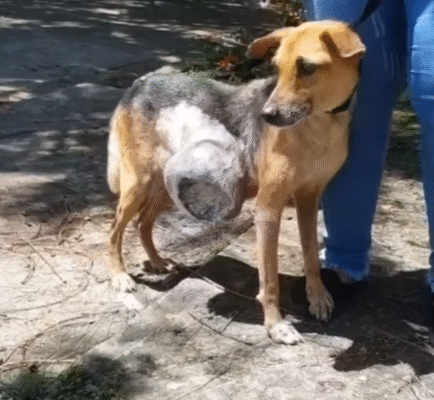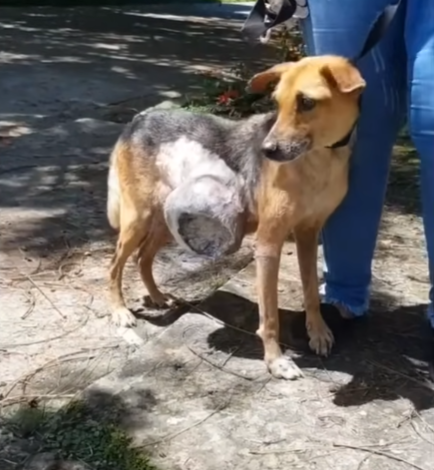
The morning light filtered through the thin hospital curtains, casting soft golden lines across the white sheets. The room was quiet except for the rhythmic hum of the machines — a heartbeat of mechanical compassion. On the bed sat a man named Ethan Moore, his shoulders slumped, his gaze fixed on the swelling that protruded grotesquely from his side.
It wasn’t always like this.
Just a year ago, Ethan had been the kind of man others admired — strong, dependable, always smiling even when life got hard. He worked as a carpenter in his small town, known for his patience and craftsmanship. His hands, once firm and sure, had built cribs for newborns and tables for families. He loved his work because it gave him purpose — it made him feel like he could build something that would last, even when everything else in life felt fleeting.
Then came the pain.
It started as a dull ache, a throbbing discomfort near his ribs. At first, he ignored it — just another strain from long hours at work. But as weeks turned to months, the pain deepened, spreading like fire beneath his skin. When he finally went to the doctor, the diagnosis came swiftly, cruelly: a tumor, large and growing.
Surgery wasn’t an option, they said. It was too risky. The cancer had already spread too far.
Ethan remembered the moment he heard those words — how the world seemed to fall silent around him. The air left his lungs. He wasn’t afraid of dying; he was afraid of suffering. Of being trapped in a body that no longer listened to him.
Now, months later, the once-strong carpenter had become a shadow of himself. His body was frail, his skin pale and thin. The tumor had grown so large it pushed against his ribs, an ever-present reminder of his helplessness.
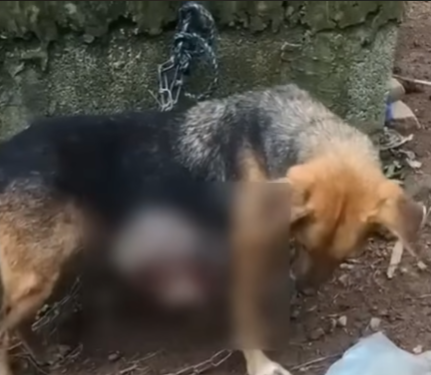
That morning, he sat alone on the edge of the bed, the weak light spilling across his trembling hands. He looked down at the bulge under his hospital gown — angry, red, and alive in a way that felt cruel. His throat tightened as he whispered to the empty room,
“Why am I suffering so much?”
His voice cracked under the weight of those words.
He had asked it before — in the dark, in pain, when sleep refused to come. But this time, it was different. This time, it wasn’t just a question; it was a plea.
A soft knock broke the silence. The door creaked open, and a young nurse named Clara entered. She had been assigned to Ethan for nearly three months now. She was gentle, the kind of person who smiled with her eyes.
“Good morning, Mr. Moore,” she said, her voice calm.
Ethan forced a small smile. “Morning, Clara.”
She moved about the room quietly, checking his vitals, adjusting his IV line. When she noticed his gaze fixed downward, she paused.
“Does it hurt today?” she asked softly.
Ethan’s lips trembled. “It always hurts,” he said. “But that’s not what scares me.”
Clara tilted her head. “What does?”
“That I’ll forget who I was before this,” he said, his voice barely a whisper. “Before the pain, before the fear. I used to laugh easily. I used to build things with my hands. Now…” He looked at his trembling fingers. “Now all I build are questions I can’t answer.”
Clara’s eyes softened. She pulled up a chair and sat beside him.
“You haven’t lost who you are, Ethan,” she said. “Pain doesn’t erase the person you’ve been — it just hides him for a while.”
He chuckled bitterly. “Maybe. But it’s hard to believe that when all I see is this.” He gestured toward the tumor, his voice breaking. “It’s like a part of me turned against myself.”
Clara reached out and gently touched his hand. “You’re more than your illness. You’re still Ethan — the man who makes everyone laugh when he talks about his workshop. The man who refuses to give up, even when it hurts.”
Ethan turned his gaze toward her, his eyes glistening. “You make it sound easy.”
“It’s not,” she admitted. “But neither is choosing hope every morning. And yet you do it.”
Her words lingered in the air, soft but powerful. For a moment, the world felt a little less cruel.
That afternoon, Ethan’s best friend Sam came to visit. Sam had known Ethan since they were boys — two dreamers who grew up building treehouses and carving wooden toys. When he entered the room, his eyes flickered with pain at the sight of his friend.
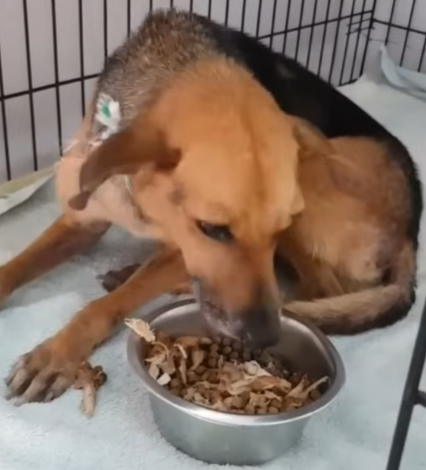
“Hey, builder,” Sam said gently, forcing a smile. “Still giving the nurses a hard time?”
Ethan chuckled weakly. “Not as much as you used to.”
They shared a quiet laugh, and for a moment, it felt almost normal. Sam sat beside him, the weight of unspoken emotions hanging heavy between them.
After a while, Ethan sighed. “Sam, do you ever think about why bad things happen to good people?”
Sam nodded slowly. “All the time.”
“Then what’s the answer?” Ethan asked.
Sam hesitated. “I don’t think there is one,” he said honestly. “But I do think pain… it changes us. Sometimes it makes us bitter. But sometimes, it makes us softer — more grateful. I’ve seen people become angels through their suffering.”
Ethan looked down again, his voice trembling. “I don’t feel like an angel. I just feel tired.”
Sam placed a hand on his shoulder. “Then rest, brother. You don’t have to carry this alone.”
Ethan’s eyes filled again. “I’m scared, Sam. Not of dying. But of being forgotten.”
Sam’s grip tightened. “No one could ever forget you, Ethan. You’ve built too much love for that.”
That night, as the world outside darkened and the machines hummed softly, Ethan lay awake, staring at the ceiling. The pain was sharp, stabbing through him like knives. But there was something else now — a strange peace that seemed to whisper through the suffering.
He thought about Clara’s words, about Sam’s steady presence. About all the lives he had touched — the furniture that still sat in homes, the laughter he had shared, the people who still remembered his kindness.
Maybe, he thought, life wasn’t about escaping pain. Maybe it was about finding meaning within it.
He turned his gaze to the small wooden cross that hung on the wall — one he had carved years ago. The edges were rough, imperfect, but it was his creation. A reminder of who he had been — and who he still was.
Tears slid down his cheeks.
“Maybe this is my last project,” he whispered into the darkness. “Not something I build with wood… but something I build with faith.”
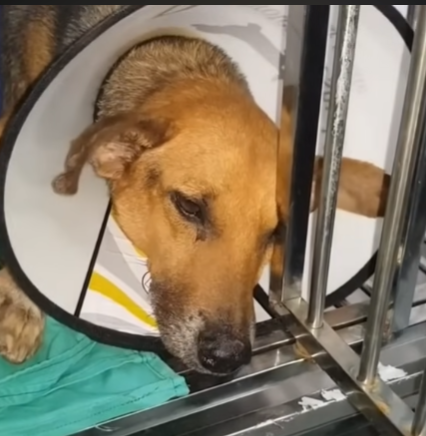
He closed his eyes and breathed deeply, feeling the ache in his body. But this time, the question that had haunted him — Why am I suffering so much? — no longer felt like a curse. It felt like a bridge.
Because through his pain, others had found compassion. Through his struggle, people had remembered the strength of kindness. Clara had learned patience. Sam had rediscovered faith. And maybe, just maybe, Ethan’s suffering had carved something beautiful in the hearts of those around him.
Weeks later, when Ethan’s time finally came, he left quietly — just as he had lived. The sun had just begun to rise, painting the sky with soft orange light. Clara found him with a peaceful expression on his face, the small cross still resting in his hand.
At his funeral, the entire town came. People shared stories — of his laughter, his craftsmanship, his courage. Sam stood before the crowd and said, voice trembling,
“Ethan once asked me why he was suffering so much. I don’t think any of us can truly answer that. But I know this — his suffering wasn’t meaningless. It taught us how to love deeper, how to care harder, how to see beauty even in brokenness.”
And as the crowd bowed their heads, tears fell freely — not just for the man they lost, but for the light he left behind.
Because sometimes, those who suffer the most end up teaching the world the greatest lessons — that strength isn’t about the absence of pain, but the courage to face it with grace.
And somewhere, beyond the pain and the questions, Ethan Moore finally found peace — free, whole, and unafraid.
